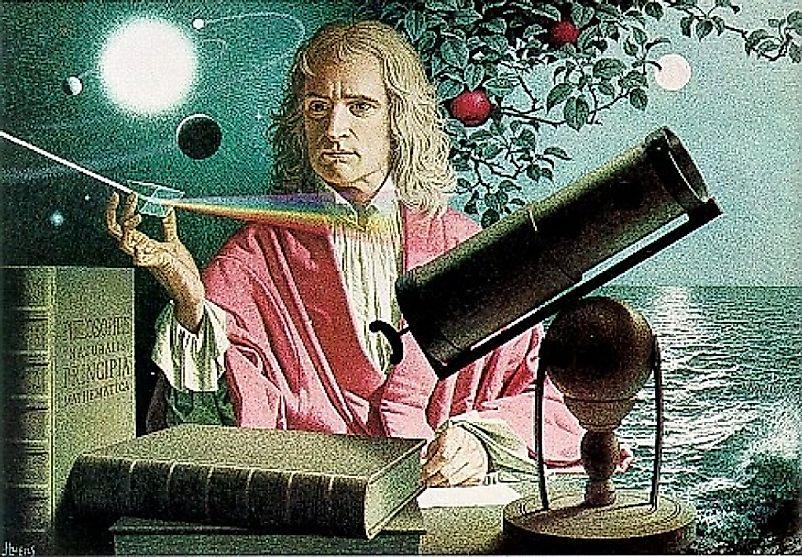Aperçu
Révolution scientifique, révolution scientifique
)etc.Althoughtheexacttimingofthescientificrevolutionisstillcontroversial,somepeoplebelievethatthegerminationofthehistoryofsciencebeganinthe14thcentury,whileothersbelievethattherevolutionsinchemistryandbiologybeganinthe18thand19thcenturies. Le referredtobymosthistoriansofsciencebeganaround1543 de révolution mécaniste, thatNicholasCopernicuspublishedthebook "Derevolutionibusorbiumcoelestium); AndréVesseliuspublished" Dehumanicorporisfabrica etc.Althoughtheexacttimingofthescientificrevolutionisstillcontroversial, somepeoplebelievethatthegerminationofthehistoryofsciencebeganinthe14thcentury, whileothersbelievethattherevolutionsinchemistryandbiologybeganinthe18thand19thcenturies.
Essence
La révolution scientifique est une révolution dans la façon de penser scientifique, et un changement majeur dans la façon de penser scientifique est l'essence de la révolution scientifique.
Thetransformationofscientificthinkingmodeisameanstosolvethecrisesthatoccurredintheprocessofscientificprogress.Everymajorbreakthroughinscientificdevelopmentiscloselyrelatedtotheemergenceofnewscientificresearchmethods.Therefore, thelevelofdevelopmentofeachscienceandthewholesciencecanbejudgedaccordingtothedegreeofperfectionofthemethodstheyadopt.Intheprocessofthescientificrevolution, thescientificthinkingmethodformedfromthebreakthroughofacertaindisciplinewillquicklyspreadtootherdisciplines, andevenpenetrateintoawiderangeofsociallife, thusdevelopingintoauniversalscientificthinkingmodeandimprovinghuman'sCognitiveability.
Impacter
La révolution scientifique est un bond qualitatif dans la compréhension humaine du monde objectif, et elle aura inévitablement un impact énorme sur la pratique sociale humaine. L'impact positif de la révolution scientifique sur la société se manifeste sous deux aspects.
D'une part, sur la base de nouvelles théories scientifiques, de nouvelles technologies, de nouveaux outils de production et de nouveaux savoir-faire ont été inventés, de sorte que la force productive sociale s'est développée à une nouvelle étape.
D'autre part, la nouvelle pensée scientifique, le nouveau mode de pensée scientifique et le nouvel esprit scientifique élevé par la révolution scientifique en tant que force culturelle énorme affectent profondément la vie spirituelle et le progrès social et culturel des gens. Dans l'histoire du développement de la société humaine, les révolutions scientifiques sont souvent les précurseurs des révolutions sociales.
ThewritersofMarxistclassicsattachgreatimportancetothestudyofscientificrevolutionissues, andhavelaidatheoreticalandmethodologicalbasisforthestudyofscientificrevolutions.EngelscalledCopernicus'sastronomicalrevolutionasnaturalsciencetodeclarehisindependentrevolutionarybehavior.Hepointedoutthattheprogressofmaterialproductionwasthebasisofthisscientificrevolutionandconnectedthenaturalsciencerevolutionwiththerevolutionarychangesexperiencedbysociety.Engelsalsoanalyzedthenaturalsciencerevolutioncausedbythethreediscoveriesofnaturalscienceinthe19thcentury.Leninanalyzedfromthephilosophicalepistemologythephysicalrevolutioncausedbythediscoveryofradioactivityattheendofthe19thcentury.

En 1962, la « Structure de la révolution scientifique » de TSKuhn a été publiée, ce qui a déclenché des recherches plus approfondies sur la question de la révolution scientifique dans la philosophie contemporaine des sciences et la sociologie des sciences.
Kuhn'sviewofscientificrevolutionisthetheoryof « paradigme » (theearliermainlandtranslationwastranslatedas « norme », theTaiwantranslationwastranslatedas « modèle », et « paradigme » wasanewtranslationbyPekingUniversityPressin2003Used), thisisahugeinnovationinthehistoryofscience, denyingthecontinuousaccumulationtheoryoflogicalpositivismandPopper'sscientificviewof "continuousrevolution" .Kuhnhimselfalsocausedgreatcontroversybecausethedefinitionof "paradigme" wasalwaysunclear.Duringthetransitionalperiod, Kuhnredefineditandinterpreted "paradigme" comme "scientificsubstrate." Bien que la théorie de Kuhn sur la révolution scientifique soit l'une des lectures les plus fondamentales de l'histoire des sciences, certains chercheurs chinois ont récemment soutenu qu'elle met l'accent sur les changements quantitatifs tout en ignorant les changements qualitatifs, niant le lien entre les deux « paradigmes » avant et après la révolution scientifique.
Quatrerévolutions scientifiques
La première
Elle s'est déroulée aux XVIe et XVIIe siècles, représentée par la "théorie héliocentrique" de Copernic, qui a initialement formé le système scientifique émergent de la théologie médiévale et de la philosophie empirique était complètement différent, marquant la naissance de la science moderne.
La deuxième fois
Elle s'est déroulée au XIXe siècle et s'est concentrée sur les percées théoriques majeures en chimie, en physique et en biologie.
La troisième fois
Fromtheendofthe19thcenturytothebeginningofthe20thcentury, thediscoveryofX rayons, électrons, naturalradioactivity, DNAdoublehelixstructure, etc.madehumansunderstandthestructureofmatterfromthemacroThedomainentersthemicrodomain.Theestablishmentofthetheoryofrelativityandquantummechanicshasbroughtaboutmajorchangesinthetheoryofphysicsandtheentirenaturalsciencesystem, aswellastheoutlookonnatureandtheworld.Therapiddevelopmentoforganicchemistry, molecularbiologyandgeneticengineering, biotechnologie, microelectronicsandcommunicationtechnologyhasmarkedthedevelopmentofscience.Developmenthasenteredthemodernera.
La quatrième fois
AccordingtoZengBangzhe'spointofview, thefourthscientificrevolutionissystemsscience, theoldandnewtheoriesandthetechnologiesofcomputerscience, IntelligenceArtificielle, nanochimie, Biomédecine, etc.Integrationandmethodintegration, thebirthofsystemsbiologyscienceopenedthefourthrevolutioninscienceandtechnology, includingsystemsbiologyandsystemsmedicine, systemsgeneticsandsystemsbiotechnology, syntheticbiologyandsystemsbioengineering, etc., whichwillleadtothe21stcenturyThetransformationalmedicineandthebioindustrialrevolutionhaveformedacompleteexperimentalandsystematictwo-dimensionalscientificsystem.
L'importance de la révolution scientifique
L'importance de la révolution scientifique est d'abord de changer la perception des gens sur la science.
Duringthefirstscientificrevolution, peoplebelievedthatscientificknowledgewasprovenknowledge.Scientifictheoriesarederivedstrictlyfromempiricalfactsobtainedthroughobservationandexperiment.Scienceisbasedonwhatwecansee, entendre, andtouch ... Personalopinionsorhobbiesandspeculativeimaginationhavenoplaceinscience.Scienceisobjective.Scientificknowledgeisreliableknowledgebecauseitisobjectivelyprovenknowledge.ThisscientificrevolutionoccurredmainlyintheseventeenthcenturyandwascausedbythegreatpioneerscientistsGalileoandNewton.
Le philosophe François Bacon et beaucoup de ses contemporains ont résumé cette attitude scientifique à l'époque.
Theprogressiveforcesintheseventeenthcenturyfinallyrealizedthatthemedievalnaturalphilosopherswereobsessedwithancientpeople, especiallytheworksofAristotle, andtheyusedtheBibleandothermajorreligiousclassicsasscientificknowledgeThesourceofiswrong, anditcannotbefalsified.Inspiredbythesuccessof "greatexperimenters" suchasGalileo, theyincreasinglyregardexperienceasasourceofknowledge.Sincethen, thisevaluationhasonlybeenreinforcedbythebrilliantachievementsofexperimentalscience.JJDaviswroteinhisbook "OntheMethodofScience": "Scienceisbuiltondefactobuildings" H · D · Anthony'slatestevaluationofGalileo'sachievementsisasfollows:
Ce qui a causé la rupture avec la tradition, ce n'est pas tant l'observation et l'expérience que Galilée a faites, que c'est une attitude à l'égard de l'observation et de l'expérience.
Perspectives futures
Thethoroughscientificrevolutionsinhistoryareallbasedonthechangeofscientificconceptastheprecursorandapproach.Thecontemporaryworldscientificrevolutionhasgraduallyunfolded, andChinanowurgentlyneedstorealizethetransformationofthescientificview-thatis, toreplacethenarrowscientificviewwitharevolutionaryscientificviewthatcanintegrateEasternandWesternsciences (referringtothescientificviewwithWesternlearningastheonlyscientificparadigm)). Withoutthisconceptualchangeasthefoundation, Chinacannotentertheeraofscientificrevolution, andcanonlybecomeafollowerandelementaryschoolstudentofWesternscientificrevolutionagain.Inthatway, Chinacanonlymakeupforthechangeofscientificoutlookafterfollowingthewesternscientificrevolution, andthenChinawillonceagainlosethehistoricalopportunitytoenterthedevelopedcountries.
Thechangeofscientificoutlookisofgreatsignificancetothecontemporaryscientificrevolution.IfChinacontinuestoidentifywiththeconceptofsmallscience, thenitcanonlytakethedevelopmentpathoftechnologicalprogress, andwillneverbetheleaderoftheworldscientificrevolution.However, afterthescientificrevolution, itwillstillfollowthesuccessofthescientificrevolutionandchangetheconceptofscience, ifChinaitselffirstBychangingthenarrowviewofscienceintoabigscientificviewthataccommodatesEasternandWesternscience, Chinacantaketheleadinlaunchingandleadingtheworldscientificrevolution, andpromptingothercountriesandtheworldtorealizethetransformationofscientificviewandscientificrevolutionassoonaspossible.
Scientificrevolutionsareoftentheforerunnersofsocialchangesandpromotesocialprogress.Thescientificrevolutionmayinvolvetheentirescientificknowledgesystem, mayalsoinvolveawiderangeofscientificfields, oronlyinvolveacertaindiscipline.Whentheoriginaldominantscientificconceptsandtheoreticalsystemsencounteredgreatdifficultiesinthefaceofnewfacts, theywereunabletosatisfactorilyexplainandexplainthenewfacts, indicatingatheoreticalbreakthrough.Thistheoreticalcrisisisasignofthematurityofthescientificrevolution.
Theestablishmentofnewbasicscientificconceptsandtheoreticalsystems, andreplacingtheoriginalconceptsandtheoreticalsystems, isthecontentofthescientificrevolution.Therefore, thescientificrevolutionisafundamentaltransformationofthescientificsystem.Therelationshipbetweenoldandnewconceptsandtheoriesisverycomplicated.Sometimesnewconceptsandtheoriesoverthrowandcompletelyreplacetheoriginalconceptsandtheories; sometimesnewconceptsandtheoriesincludetheoriginalconceptsandtheories, asaspecialcase, totheoriginalconceptsandtheories.Strictrestrictionsandnewdefinitionsareimposedonthescopeandboundariesofapplication; sometimesitappearsasamajorrevision, supplementanddevelopmentofnewconceptsandtheoriestotheoriginalconceptsandtheories.Thescientificrevolutionshowsaqualitativeleapinpeople'sunderstandingoftheobjectiveworld.Alongwiththeestablishmentofnewscientifictheories, people'sunderstandingofthenaturalworld, Theso-calledviewofnature, willalsoundergocorrespondingmajorchanges.Philosophycontrolstheworldbytheknowledgeprovi par la science. Par conséquent, toute grande révolution scientifique entraîne un changement de regard sur la nature.
